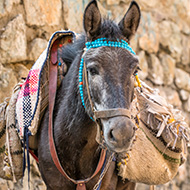Study improves awareness of pack mule welfare

The eight-year study took place in the High Atlas Mountains of Morocco.
The welfare of working equines can be improved by training owners to recognise and address signs of physical and emotional distress, new research suggests.
The eight-year study took place in the High Atlas Mountains of Morocco, during which the team trained mountain guides in pack animal welfare and trekking teams to work more compassionately with their mules.
Their findings, published in the Journal of Awareness-Based Systems Change, fed into the development of company practices and new industry standards.
They also mark the first time such an approach has been used with non-human animals actively being listened to as participants and stakeholders.
Study author Dr Glen Cousquer, from The Royal (Dick) School of Veterinary Studies, commented: “Our approach of extending action research to include pack mules working in mountain tourism as participatory stakeholders has led to greater awareness of mule welfare and changes in the practices of stakeholders to improve the working conditions and welfare of mules.
“If this shift of awareness is sustained over time, it can contribute to the development of more equitable working practices based on a willingness to listen, care and change how we choose to act as members of the international mountain tourism community.”
Pack animals in the international mountain tourism industry are often negatively impacted by bitting, overloading, tethering injuries and lameness.
During training, the team noted that mules and their handlers benefited from a common platform for their concerns to be heard and addressed. In turn, this helped establish a sense of collaboration and solidarity between the humans and the animals.
Researchers say such training can provide opportunities for a comprehensive One Health approach to be followed.



 The veterinary mental health charity Vetlife is inviting the veterinary community to join it for a sponsored cold-water dip.
The veterinary mental health charity Vetlife is inviting the veterinary community to join it for a sponsored cold-water dip.